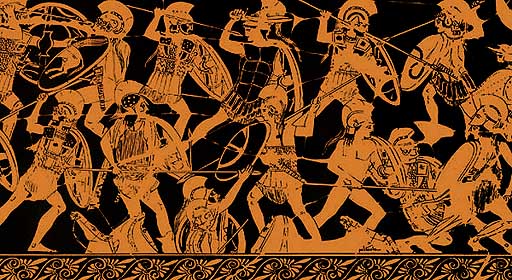
Brennius was a legendary king of Northumberland and Allobroges, as recounted by Geoffrey of Monmouth. He was the son of Dunvallo Molmutius and brother of Belinus, probably based upon one or both of the historical Brenni or Bran.
Claimant to the throne of Britain
In an effort to win the crown of Britain, Brennius and Belinus waged war between each other to determine who should succeed their father. Many battles were fought between the two brothers until a time came when their friends intervened and a compromise was decided upon. Belinus became the King of the Britons with Brennius as King of Northumberland. The story is a variation on the light and dark aspect of man the twin duality represented as brothers, yet being the sons ofDunvallo Molmutius.
Five years later, Brennius wed the daughter of the King of Norway without consulting Belinus. Belinus invaded Northumberland and seized Brennius’s land. Brennius heard of this violation and gathered a large Norwegian army together to sail for Britain. On the way, a fleet of ships under the King of Denmark attacked because the king wanted Brennius’s wife for himself. They fought in the open ocean and the two sides dispersed. The King of Denmark managed to capture the wife of Brennius but he then got lost and landed on Britain. Belinus captured the king and his brother’s wife. Brennius landed in Albany and demanded the return of all his lands and his wife. If not, he swore he would kill Belinus if they ever met in battle.
Belinus called to arms all of Britain against Brennius and the two armies met in the forests of Calaterium. The battle was fought ruthlessly and Belinus defeated the army of Brennius. Brennius fled to Gaul and Belinus became king over all the Britons.
Duke of the Allobroges
While in Gaul, Brennius travelled from king to king explaining his situation. All denied him help or protection until the Duke of the Allobroges, Segnius, befriended him. He became highly influential in the duke’s ranks and was given the duke’s daughter in marriage. The duke and all his men pledged to Brennius that if the duke produced no male heirs, Brennius would succeed him as leader of the Allobroges. The duke died within the year and Brennius became duke. He divided the treasures of the duke among the people and kept an open court to them all.
Soon after becoming duke, Brennius gathered together another army and made right of passage treaties with all the Gauls. Eventually, he invaded Britain with his army and met Belinus on the battlefield. Their mother, however, persuaded Brennius to make peace.
Conqueror of Rome
Not having one another to fight with, the brothers now agreed upon a joint expedition with their armies into Gaul. The Britons and the Allobroges conquered all the other kings of the Franks, and then entered Italy, destroying villages and cities as they marched to Rome. Gabius and Porsena, the Roman consuls, bought them off with large presents of gold and silver and the promise of a yearly tribute, whereupon Brennius and Belinus withdrew their army into Germany and began to devastate it. But the Romans, now no longer taken by surprise and unprepared, came to the help of the Germans. This brought Brennius and Belinus back to Rome, which, after a long siege, they succeeded in taking. Brennius remained in Italy, “Where he exercised unheard-of tyranny over the people”. Belinus, the other brother, returned to England. “He made a gate of wonderful structure in Trinovantum, upon the bank of the Thames, which the citizens call after his name Billingsgate to this day. Over it he built a prodigiously large tower, and under it a haven or quay for ships. . . . At last, when he had finished his days, his body was burned, and the ashes put up in a golden urn, which they placed at Trinovantum, with wonderful art, on the top of the tower above mentioned.” He was succeeded by Gurgiunt.
Comments on historicity
One should note that Rome was indeed captured by Brennus following the Battle of the Allia on July 18, 390 BC. Gabias and Porsenna are not mentioned in any Roman sources. The later is a namesake of Lars Porsena, a King of the Etruscan civilisation who is believed to have fought against the recently founded Roman Republic in a decade of the 500s BC.
Further Study
The God Belinus : House of Judah Take Power in Britain
History
1 Comment on “Brennius king of Northumberland and Allobroges”
Comments are closed.